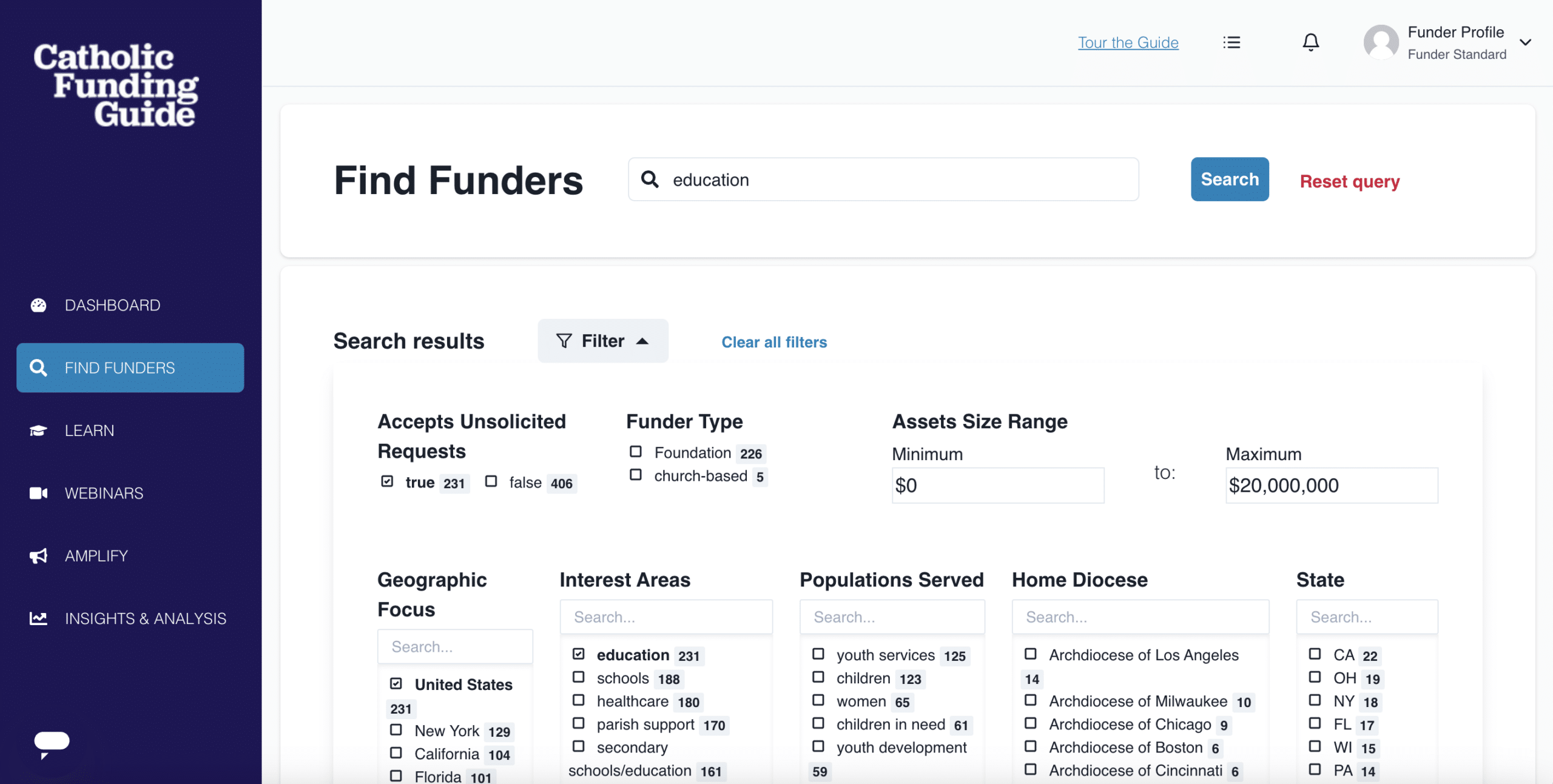In order to carry out the work of Catholic philanthropy, you need grantees who will further your mission. If you set out to find grantees without a firm grasp of what you are looking for, you may spend a lot of valuable time sorting through irrelevant grant applications or funding projects that are not aligned with your mission.
What kind of organization do you want to support? How do you know if you have found the right fit? We share some key considerations to discuss with your team.
Evaluating a Grant Proposal vs. Knowing What You Want in a Grantee
Knowing what to look for in a grantee is not quite the same as evaluating a grant proposal, although they are related. It requires a different mindset; an understanding that you are funding an organization, not just a project.
Before you evaluate proposals, you need to know what kind of organization you want to fund. This will help you make better decisions in the long run. It will also save you time as you attract the right candidates in your grant application guidelines and other networking efforts.
Additionally, if you have any interest in giving unrestricted grants or funding operating support, it is essential that you begin with a clear idea of what kind of grantee would be a good fit for your philanthropic goals.
What Do You Think You Should Look For?
You likely already have a process in place that you use to evaluate all grant applications. Similarly, you should also have guidelines that explain the desired qualities of a grantee. This may simply entail a few key principles, or it may be a very detailed list.
To begin, ask yourself (and your team) what you think you should look for in a prospective grantee. Chances are, you already have a solid idea; you just need to articulate and refine it.
Write down the most important points, and think about aspects such as first impressions, mission alignment, planning and goals, community involvement, and financial responsibility.
First Impressions & Communication
The way a grantee approaches those first interactions with your organization can tell you a lot about them. When considering first impressions with your prospective grantee, you can reflect on the following questions:
- Did the organization respect how you wanted to be approached?
- Does the grantee seem interested in building a relationship and furthering a shared mission rather than just winning a grant?
- Is the grantee articulating how they plan to fill a gap or meet a need?
- How did the grantee find you? Were they referred to you by a mutual connection? Did they find you in the Catholic Funding Guide?
- Did they follow your grant application guidelines?
- Does the organization have a solid plan for success, and do you feel they are likely to succeed based on their track record, plan details, and other relevant data?
- Is the organization listed in the Official Catholic Directory?
- As the proverbial saying goes, actions speak louder than words. Do the actions of the prospective grantee seem to fit with the statements in their proposal? Research the organization’s past projects, history, level of financial responsibility, and more to get a sense of who they really are.
Mission Alignment
Is there mission alignment between your organization and the prospective grantee? For many foundations and philanthropists, this will be the most important question of all.
“The ‘what’ we fund from time period to time period can be shifted, but our ‘why’ is something we intend to be permanent.” – Joe Womac, President, Specialty Family Foundation
This quote is from a live virtual panel of experienced funders offering advice to grantees. The full recording is available for subscribers to the Catholic Funding Guide. The advice is also helpful to grantmakers who want to become more strategic in their giving.
Look out for signs that the prospective grantee is a good fit for your mission, such as:
- They have a clear why that genuinely matches yours (they didn’t just create a program to fit your mission).
- You have a passion about their project or organization that mirrors the passion you have for your own mission.
- Your organization and theirs have similar overarching goals.
- In regards to their mission, they remind you of other grantees you’ve funded.
Collaboration & Community Involvement
For many funders, depending on your line of work and areas of interest, it is beneficial to assess how the prospective grantee collaborates with other organizations, as well as their level of community involvement. You may want to consider:
- Are community partners or other funders involved with the organization, and who are they? What can you learn about their relationship and their work together? What are their thoughts on the prospective grantee?
- How well does the potential grantee understand the community they serve? Are they aware of other organizations doing work related to theirs? Do they make efforts to meet a unique need, rather than duplicating the efforts of others in the community? Oftentimes the plan outlined in the proposal will give you a baseline idea of their understanding, but you can ask them to tell you more, as well.
Planning & Goal Setting
For most funders, an ideal grantee has a strong ability to set goals, plan well, and conceptualize what steps are needed to succeed.
- What are the grantee’s goals over the next several years?
- Are they proactive? Do they have a plan for sustaining the program or continuing the work in some way?
- Does their proposed project seem too polished or perfect? While it should be thoughtfully planned and compellingly presented, no project is perfect. It is usually a red flag if the grantee fails to acknowledge any roadblocks or challenges and ways to overcome them.
“We don’t want to fund things that are going perfectly… I actually really like when a school applies and says, ‘We’re really proud of our history, we’re proud of who we serve, we’re proud of our graduation rates, we’re not proud of our math scores. And we’re not blaming our teachers. We’ve got to figure this out.’ And they don’t hide the thing they’re least happy about with how it’s going. They actually front it.” – Joe Womac, President, Specialty Family Foundation
Financial Considerations
Financial stability and risk are concepts you will evaluate more thoroughly in a proposal, but you can also include them generally in your list of what to look for in a grantee. For example:
- Does the organization have a history of good money management? Do they have good rapport with other grantmakers?
- Does the organization have a realistic budget?
- If you are funding operating costs or a similar need for a struggling organization, do they have a solid recovery plan?
What to Look for in Prospective Grantees: The Final Decision Is Yours
At the end of the day, only you can determine what your non-negotiable qualities are when looking for a grantee. Aspects such as good communication, transparency, responsibility, and community involvement can be good indicators of whether a grantee is a worthy recipient and a steward of your mission, but they are not the only factors.
Your mission is the primary consideration, and how you believe this grantee will further your mission for the greater good of God’s kingdom is paramount.
Learn more about creating great relationships with the grantees you select.


